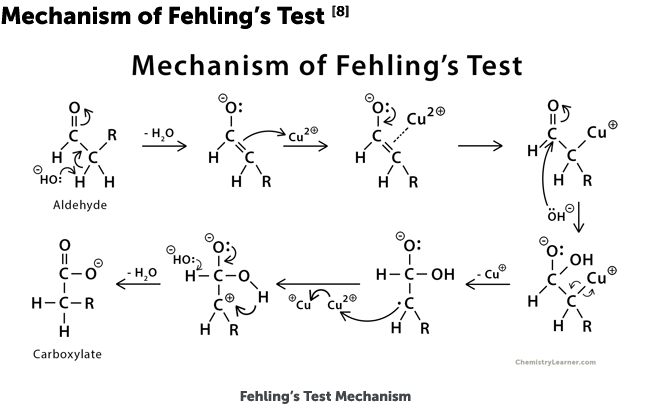While I understand why aromatic aldehydes and ketones do not give positive Fehling's test, I do not know why Glyoxal and Glyoxylic Acid give a negative test too. Nothing has been written about these two compounds in my study material and I was hoping someone could help me out with the reasoning. I figure it's something to do with presence of alpha-H but I'm not sure.
-
$\begingroup$ See: chemistry.stackexchange.com/questions/90778/… $\endgroup$– Nilay GhoshCommented Jun 13, 2022 at 2:23
-
1$\begingroup$ I have seen that question, and the answer did not satisfy the user who asked nor did it answer my question. $\endgroup$– Dhruv KaushikCommented Jun 13, 2022 at 4:10
1 Answer
There is a good diagram of the mechanism here that I have reproduced below.
The first step is the formation of an enolate anion of the aldehyde by removal of the alpha proton by hydroxide. The enolate then binds to Cu2+. If the enolate cannot be formed then the reaction cannot proceed. Glyoxal and Glyoxylic Acid cannot form enolates so they give a negative test. The only proton that can be removed from glyoxal to form an enolate is the proton on a -CHO group. They are far less acidic than the alpha protons of an aldehyde. Glyoxalic acid obviously deprotonates at the carboxylic acid group, so no enolate forms.
-
$\begingroup$ Why can't glyoxal form the enolate? $\endgroup$ Commented Jun 13, 2022 at 10:27
-
$\begingroup$ @DhruvKaushik I have edited to answer this $\endgroup$ Commented Jun 13, 2022 at 11:23
-
$\begingroup$ @Waylander Just curious, will glyoxal give tollens test? $\endgroup$– PiyushCommented Dec 12 at 10:13
-
1$\begingroup$ @Piyush Tollens does not require enolisation as it goes through a radical mechanism (see this answer chemistry.stackexchange.com/questions/13918/… ) so I believe it will give a positive Tollens test. $\endgroup$ Commented Dec 12 at 10:33

